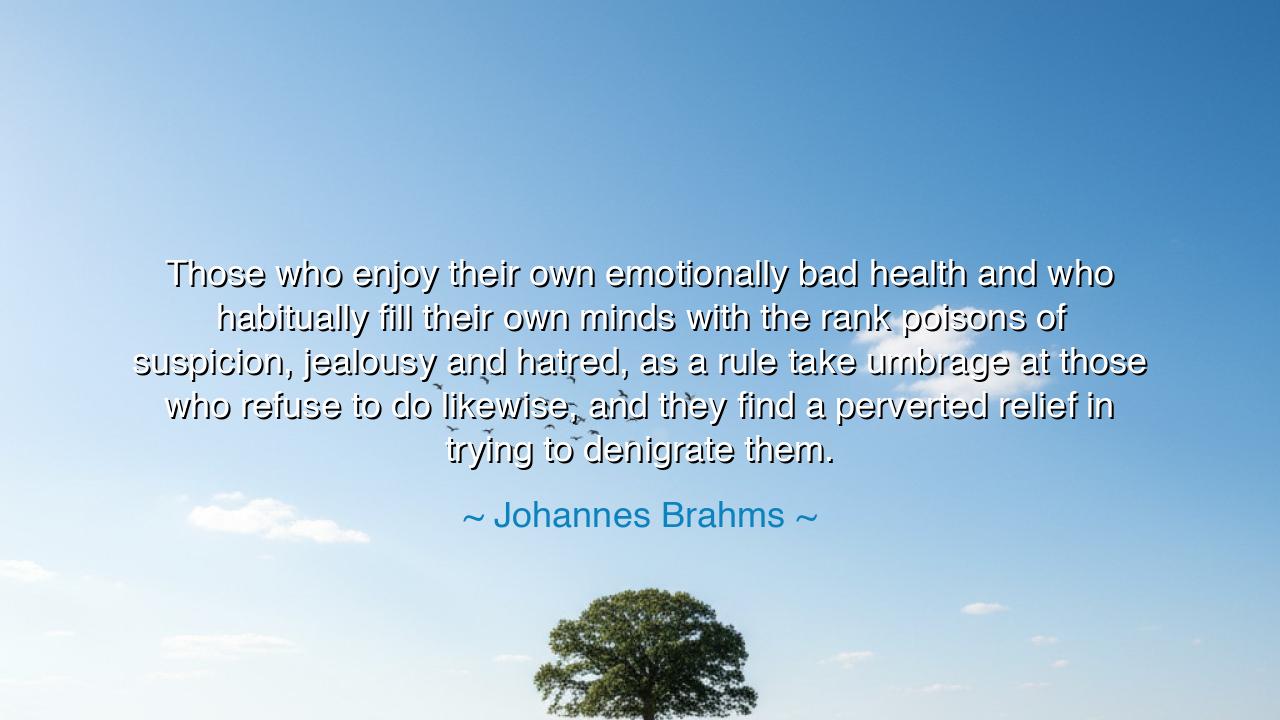
Those who enjoy their own emotionally bad health and who
Those who enjoy their own emotionally bad health and who habitually fill their own minds with the rank poisons of suspicion, jealousy and hatred, as a rule take umbrage at those who refuse to do likewise, and they find a perverted relief in trying to denigrate them.






The words of Johannes Brahms, “Those who enjoy their own emotionally bad health and who habitually fill their own minds with the rank poisons of suspicion, jealousy and hatred, as a rule take umbrage at those who refuse to do likewise, and they find a perverted relief in trying to denigrate them,” pierce the heart like a truth long known but seldom spoken. They reveal an eternal law of the spirit: that the diseased soul cannot bear the sight of one who is whole. For those who have become accustomed to misery, joy appears as an insult, and for those consumed by envy, peace feels like betrayal. Brahms—musician, thinker, and student of the human heart—saw that not all sickness is of the body; some ailments, more corrosive still, are born of bitterness unhealed.
To understand his meaning, we must first grasp what he calls “emotionally bad health.” This is not the sorrow that comes from grief or the struggle that forges wisdom, but the self-inflicted decay that arises when the mind feeds upon anger and suspicion. Such people, Brahms tells us, “enjoy” their illness—they cling to it as though it were identity. They rehearse old wounds, nurse imagined slights, and turn their pain into pride. Like a man who drinks poison daily and calls it nourishment, they find comfort in their own corruption. The heart becomes a swamp, breeding suspicion and resentment where no light can enter.
Brahms’s insight springs from experience as much as philosophy. Though known as one of the great composers of the Romantic era, he lived a life of solitude and introspection, observing both beauty and bitterness in those around him. Within the rivalries of 19th-century music—among critics, artists, and jealous peers—he saw how envy could consume even the gifted, transforming admiration into hatred. He understood that those who cannot create beauty often seek to destroy it, and that resentment is the refuge of those who have failed to master themselves. His words thus carry the ring of both artistic and moral truth: that emotional decay manifests as hostility toward those who dare to remain pure.
History, too, bears witness to this truth. Consider Socrates, the philosopher condemned to death by the very city he sought to enlighten. His calmness, his unshakable integrity, his refusal to indulge in hatred—these virtues enraged his accusers. They could not forgive him for being free of the poisons that ruled their own minds. In his serenity, they saw their own corruption reflected. And so, as Brahms describes, they “found relief in trying to denigrate him.” Socrates died, but his persecutors lived on—haunted by the very emptiness they refused to heal.
Emotional bad health, Brahms reminds us, is contagious if left unchecked. The envious spirit seeks company in its misery, for solitude terrifies it. Misery loves company because company dulls the sting of conscience. Those who choose bitterness crave validation from others who share it. Thus they will mock the joyful, slander the kind, and scorn the contented. They will call virtue pretension and purity hypocrisy, for to admit that goodness is real would expose their own decay. The truly healthy mind, therefore, must learn to walk in quiet strength, resisting the urge to defend itself before those who will not hear truth.
There is in this teaching both warning and hope. The warning is this: guard your inner health as fiercely as your body, for a single drop of jealousy or hatred, if nourished, can corrupt the soul. The hope is this: that emotional health—like physical wellness—can be cultivated through conscious practice. Gratitude cleanses suspicion; compassion weakens envy; forgiveness starves hatred. Each act of grace is a form of medicine, each act of love a strengthening of the spirit’s immune system.
The lesson is enduring: beware the company of those who thrive on poison, and do not mistake their mockery for truth. Walk with those who nurture peace, for in their presence your heart will heal. When others seek to drag you into their darkness, do not descend to argue—stand in the light and let your calmness be your reply. Tend your thoughts as a gardener tends his flowers, plucking out weeds of resentment before they take root. For in this lies the secret of both peace and strength: to master the mind is to protect the soul.
So let these words be passed down as ancient counsel: guard your heart from the poisons of envy, and you will walk in the company of the wise. Those who choose the sickness of hatred will crumble under the weight of their own bitterness, but those who cultivate love, joy, and patience will rise unshaken. For the health of the soul, once won, is the truest freedom—and no venom of the world can destroy it.






AAdministratorAdministrator
Welcome, honored guests. Please leave a comment, we will respond soon